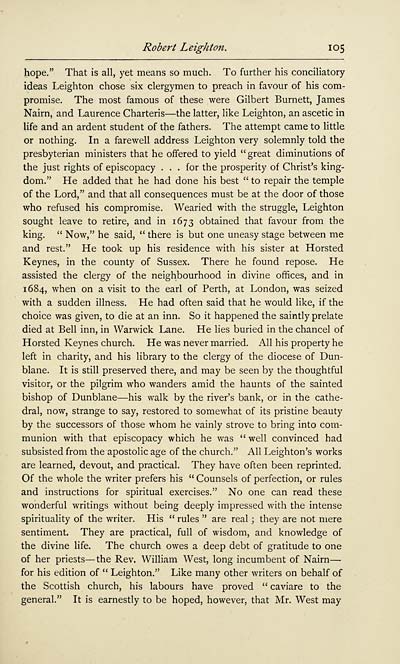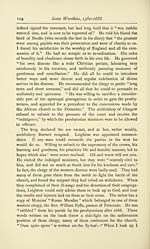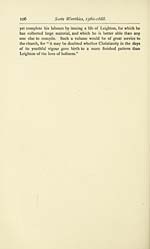Scots worthies, 1560-1688
(125) Page 105
Download files
Complete book:
Individual page:
Thumbnail gallery: Grid view | List view

Robert Leighton. 105
hope." That is all, yet means so much. To further his conciliatory
ideas Leighton chose six clergymen to preach in favour of his com-
promise. The most famous of these were Gilbert Burnett, James
Nairn, and Laurence Charteris — the latter, like Leighton, an ascetic in
life and an ardent student of the fathers. The attempt came to little
or nothing. In a farewell address Leighton very solemnly told the
presbyterian ministers that he offered to yield "great diminutions of
the just rights of episcopacy ... for the prosperity of Christ's king-
dom." He added that he had done his best " to repair the temple
of the Lord," and that all consequences must be at the door of those
who refused his compromise. Wearied with the struggle, Leighton
sought leave to retire, and in 1673 obtained that favour from the
king. " Now," he said, " there is but one uneasy stage between me
and rest." He took up his residence with his sister at Horsted
Keynes, in the county of Sussex. There he found repose. He
assisted the clergy of the neighbourhood in divine offices, and in
1684, when on a visit to the earl of Perth, at London, was seized
with a sudden illness. He had often said that he would like, if the
choice was given, to die at an inn. So it happened the saintly prelate
died at Bell inn, in Warwick Lane. He lies buried in the chancel of
Horsted Keynes church. He was never married. All his property he
left in charity, and his library to the clergy of the diocese of Dun-
blane. It is still preserved there, and may be seen by the thoughtful
visitor, or the pilgrim who wanders amid the haunts of the sainted
bishop of Dunblane — his walk by the river's bank, or in the cathe-
dral, now, strange to say, restored to somewhat of its pristine beauty
by the successors of those whom he vainly strove to bring into com-
munion with that episcopacy which he was " well convinced had
subsisted from the apostolic age of the church." All Leighton's works
are learned, devout, and practical. They have often been reprinted.
Of the whole the writer prefers his " Counsels of perfection, or rules
and instructions for spiritual exercises." No one can read these
wonderful writings without being deeply impressed with the intense
spirituality of the writer. His " rules " are real ; they are not mere
sentiment. They are practical, full of wisdom, and knowledge of
the divine life. The church owes a deep debt of gratitude to one
of her priests — the Rev. William West, long incumbent of Nairn —
for his edition of " Leighton." Like many other writers on behalf of
the Scottish church, his labours have proved " caviare to the
general." It is earnestly to be hoped, however, that Mr. West may
hope." That is all, yet means so much. To further his conciliatory
ideas Leighton chose six clergymen to preach in favour of his com-
promise. The most famous of these were Gilbert Burnett, James
Nairn, and Laurence Charteris — the latter, like Leighton, an ascetic in
life and an ardent student of the fathers. The attempt came to little
or nothing. In a farewell address Leighton very solemnly told the
presbyterian ministers that he offered to yield "great diminutions of
the just rights of episcopacy ... for the prosperity of Christ's king-
dom." He added that he had done his best " to repair the temple
of the Lord," and that all consequences must be at the door of those
who refused his compromise. Wearied with the struggle, Leighton
sought leave to retire, and in 1673 obtained that favour from the
king. " Now," he said, " there is but one uneasy stage between me
and rest." He took up his residence with his sister at Horsted
Keynes, in the county of Sussex. There he found repose. He
assisted the clergy of the neighbourhood in divine offices, and in
1684, when on a visit to the earl of Perth, at London, was seized
with a sudden illness. He had often said that he would like, if the
choice was given, to die at an inn. So it happened the saintly prelate
died at Bell inn, in Warwick Lane. He lies buried in the chancel of
Horsted Keynes church. He was never married. All his property he
left in charity, and his library to the clergy of the diocese of Dun-
blane. It is still preserved there, and may be seen by the thoughtful
visitor, or the pilgrim who wanders amid the haunts of the sainted
bishop of Dunblane — his walk by the river's bank, or in the cathe-
dral, now, strange to say, restored to somewhat of its pristine beauty
by the successors of those whom he vainly strove to bring into com-
munion with that episcopacy which he was " well convinced had
subsisted from the apostolic age of the church." All Leighton's works
are learned, devout, and practical. They have often been reprinted.
Of the whole the writer prefers his " Counsels of perfection, or rules
and instructions for spiritual exercises." No one can read these
wonderful writings without being deeply impressed with the intense
spirituality of the writer. His " rules " are real ; they are not mere
sentiment. They are practical, full of wisdom, and knowledge of
the divine life. The church owes a deep debt of gratitude to one
of her priests — the Rev. William West, long incumbent of Nairn —
for his edition of " Leighton." Like many other writers on behalf of
the Scottish church, his labours have proved " caviare to the
general." It is earnestly to be hoped, however, that Mr. West may
Set display mode to:
![]() Universal Viewer |
Universal Viewer | ![]() Mirador |
Large image | Transcription
Mirador |
Large image | Transcription
Images and transcriptions on this page, including medium image downloads, may be used under the Creative Commons Attribution 4.0 International Licence unless otherwise stated. ![]()
| Histories of Scottish families > Scots worthies, 1560-1688 > (125) Page 105 |
|---|
| Permanent URL | https://digital.nls.uk/95152526 |
|---|
| Description | A selection of almost 400 printed items relating to the history of Scottish families, mostly dating from the 19th and early 20th centuries. Includes memoirs, genealogies and clan histories, with a few produced by emigrant families. The earliest family history goes back to AD 916. |
|---|

